Related Research Articles

Midwifery is the health science and health profession that deals with pregnancy, childbirth, and the postpartum period, in addition to the sexual and reproductive health of women throughout their lives. In many countries, midwifery is a medical profession. A professional in midwifery is known as a midwife.
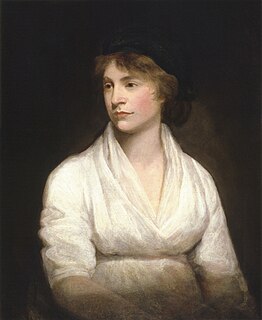
Mary Wollstonecraft was an English writer, philosopher, and advocate of women's rights. Until the late 20th century, Wollstonecraft's life, which encompassed several unconventional personal relationships at the time, received more attention than her writing. Today Wollstonecraft is regarded as one of the founding feminist philosophers, and feminists often cite both her life and her works as important influences.
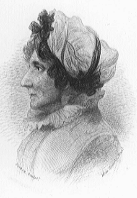
Anna Laetitia Barbauld was a prominent English poet, essayist, literary critic, editor, and author of children's literature. A "woman of letters" who published in multiple genres, Barbauld had a successful writing career that spanned more than half a century.

Mary Toft, also spelled Tofts, was an English woman from Godalming, Surrey, who in 1726 became the subject of considerable controversy when she tricked doctors into believing that she had given birth to rabbits.

Martha Ellis Gellhorn was an American novelist, travel writer, and journalist who is considered one of the great war correspondents of the 20th century.

In the New Testament, Salome was a follower of Jesus who appears briefly in the canonical gospels and in apocryphal writings. She is named by Mark as present at the crucifixion and as one of the women who found Jesus's tomb empty. Interpretation has further identified her with other women who are mentioned but not named in the canonical gospels. In particular, she is often identified as the wife of Zebedee, the mother of James and John, two of the Twelve apostles. In medieval tradition Salome was counted as one of the Three Marys who were daughters of Saint Anne, so making her the sister or half-sister of Mary, mother of Jesus.

Elizabeth Inchbald was an English novelist, actress and dramatist. She wrote two novels that have remained prominent to this day. She successfully translated and adapted several plays from German and French.

William Smellie was a Scottish obstetrician and medical instructor who practiced and taught primarily in London. One of the first prominent male midwives in Britain, he designed an improved version of the obstetrical forceps, established safer delivery practices, and through his teaching and writing helped make obstetrics more scientifically based. He is often called the "father of British midwifery".

Laurel Thatcher Ulrich is a Pulitzer Prize-winning American historian specializing in early America and the history of women, and a professor at Harvard University. Her approach to history has been described as a tribute to "the silent work of ordinary people"—an approach that, in her words, aims to "show the interconnection between public events and private experience." Ulrich has also been a MacArthur Genius Grant recipient. Her most famous book, “A Midwife’s Tale,” was later the basis for a PBS documentary film.
Martha Moore Ballard was an American midwife and healer. Unusually for the time, Ballard kept a diary with thousands of entries over nearly three decades, which has provided historians with invaluable insight into frontier-women's lives. Ballard was made famous by the publication of A Midwife's Tale: The Life of Martha Ballard based on her diary, 1785–1812 by historian Laurel Thatcher Ulrich in 1990.
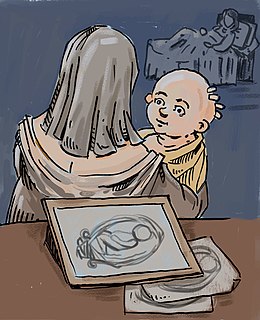
Jane Sharp was an English midwife. Her work The Midwives Book: or the Whole Art of Midwifery Discovered, published in 1671, was the first on the subject to be produced by an Englishwoman.
In pregnancy terms, quickening is the moment in pregnancy when the pregnant woman starts to feel her baby's movement in the uterus.

Emilia Francis Strong, better known as Lady Dilke, was a British author, art historian, feminist and trade unionist.
Phebe Gibbes was an 18th-century English novelist and early feminist. She authored twenty-two books between 1764 and 1790, and is best known for the novels The History of Mr. Francis Clive (1764), The Fruitless Repentance; or, the History of Miss Kitty Le Fever (1769), and The History of Miss Eliza Musgrove (1769). She received recent attention with the scholarly publication of Hartly House Calcutta (1789) in 2007.

The Inuit are indigenous people who live in the Arctic and subarctic regions of North America. The ancestors of the present-day Inuit are culturally related to Iñupiat and Yupik, and the Aleut, who live in the Aleutian Islands of Siberia and Alaska. The word "Eskimo" has been used to encompass the Inuit and Yupik, and other indigenous Alaskan and Siberian peoples, but this usage is in decline.
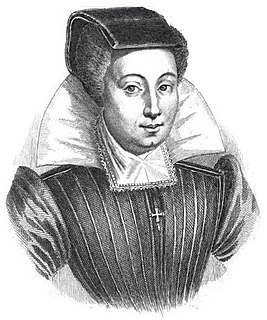
Louise (Bourgeois) Boursier (1563–1636) was a French Royal Court midwife who delivered babies for many women in her twenty-six year professional career. Marie de Médicis, the wife of Henry the Great of France, was one of her patients, and Bourgeois delivered her six children. Bourgeois' income was about ten times the average midwife's. She believed she was blessed with practical midwifery talents from Phaenarete, the mother of Socrates.

Jennifer Louise Worth RN RM was a British memoirist. She wrote a best-selling trilogy about her work as a nurse and midwife practising in the poverty-stricken East End of London in the 1950s: Call the Midwife, Shadows of the Workhouse and Farewell to The East End. A television series, Call the Midwife, based on her books, began broadcasting on BBC One on 15 January 2012. After leaving nursing, she re-trained as a musician.
Midwives in the United States assist childbearing women during pregnancy, labor and birth, and the postpartum period. Some midwives also provide primary care for women including well-woman exams, health promotion, and disease prevention, family planning options, and care for common gynecological concerns. Before the turn of the 20th century, traditional midwives were informally trained and helped deliver almost all births. Today, midwives are professionals who must undergo formal training. Midwives in the United States formed the Midwifery Education, Regulation, and Association task force to establish a framework for midwifery.
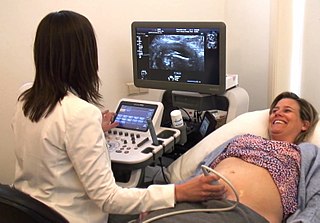
A midwife is a health professional who cares for mothers and newborns around childbirth, a specialization known as midwifery.

Modern yoga as exercise has often been taught by women to classes consisting mainly of women. This continued a tradition of gendered physical activity dating back to the early 20th century, with the Harmonic Gymnastics of Genevieve Stebbins in America and Mary Bagot Stack in Britain. One of the pioneers of modern yoga, Indra Devi, a pupil of Krishnamacharya, popularised yoga among American women using her celebrity Hollywood clients as a lever.
References
- 1 2 3 4 5 6 7 8 9 Lay, Mary M., ed. (2000). Body talk : rhetoric, technology, reproduction. Madison, Wis. [u.a.]: Univ. of Wisconsin Press. pp. 41–42. ISBN 9780299167905.
- 1 2 3 "Medecine". The Critical Review, or, Annals of Literature: 462. April 1798.
- ↑ Jones, Vivien, ed. (1991). Women in the eighteenth century : constructions of femininity (Repr. ed.). London [u.a.]: Routledge. p. 246. ISBN 0415034884.
- ↑ "Brooklyn Museum: Martha Mears". www.brooklynmuseum.org. Retrieved 24 April 2020.